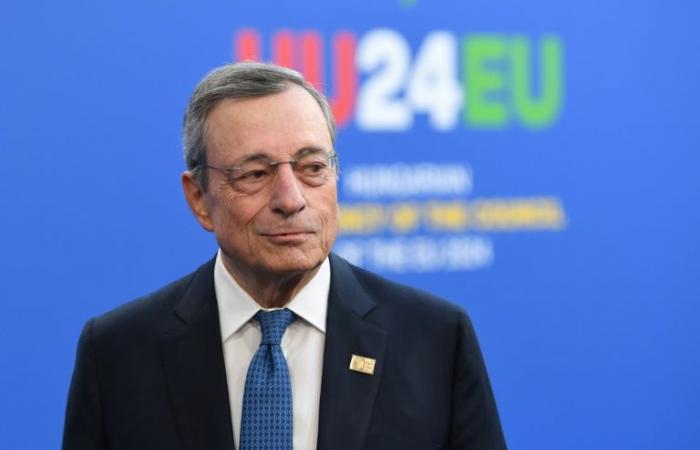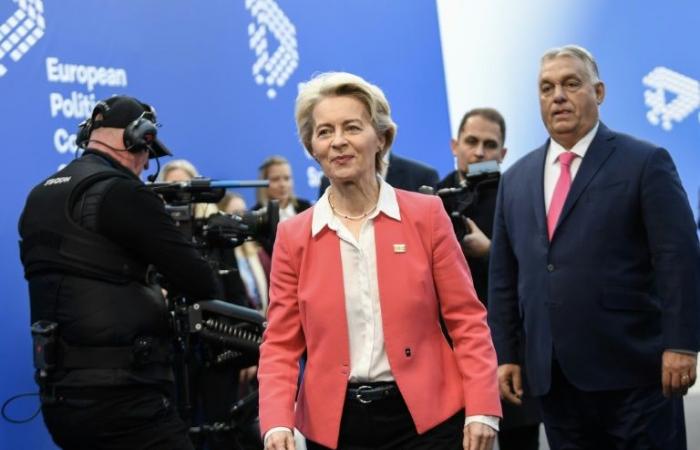Economic reforms in the European Union have become “even more urgent” with the election of Donald Trump in the United States, warned Mario Draghi on Friday who came to present his proposals to the leaders of the Twenty-Seven meeting at a summit in Budapest.
The former Italian Prime Minister published a report at the beginning of September to revive growth in a Europe which is stalling compared to the United States.
“The recommendations in this report were already urgent, given the economic situation we find ourselves in today. They became even more urgent after the American elections,” he said upon his arrival in the Hungarian capital. .
“There is no doubt that Trump's presidency will mark a big difference in relations between the United States and Europe,” he added.
The American billionaire has promised to tackle EU trade surpluses by taxing imports of European products.
If it does not make radical changes, the EU will experience “a slow agony”, Mario Draghi had already warned in September.
Europe must revive its growth through massive investments in digital innovation, the green transition and defense industries, he estimates in his 400-page document.
Competitiveness is at the heart of the second mandate of Ursula von der Leyen, the president of the European Commission reappointed this summer, who promised to draw inspiration from the conclusions of Mario Draghi.
However, between divergent interests and ideological disagreements between member states, the success of the project is anything but guaranteed.
Largely inspired by French ideas supported by President Emmanuel Macron, the text raises certain reservations in Germany.
It contains “many improvements and innovations that (Europe) needs”, greeted Chancellor Olaf Scholz on Friday without evoking a sense of urgency.
“This is a moment of strategic awakening for Europeans with what is happening in the United States,” said French Minister for Europe Benjamin Haddad, referring to “a great convergence” of views between the Twenty-Seven.
A wall of investments
The picture drawn up by Mario Draghi is gloomy: Europe is experiencing an economic decline compared to the United States and is dangerously increasing its dependence on China for certain raw materials and strategic technologies. Per capita income “has increased almost twice as much in the United States as in Europe since 2000,” he emphasizes.
The former president of the European Central Bank estimates the necessary investments in the Old Continent at between 750 and 800 billion euros per year, more than the Marshall Plan of the United States which supported the reconstruction of Europe after the Second War. worldwide.
This investment wall is an immense challenge for the 27 EU countries as they try to reduce their debt and budget deficits.
“The Draghi report is an excellent basis” for work, said the President of the European Council, Charles Michel.
EU leaders recognize “the urgency of decisive action”, in a draft text which takes up the main avenues put forward by Mario Draghi: deepening of the single market, union of capital markets, implementation of 'a trade policy that defends European interests, regulatory simplification…
But they remain vague on budgetary issues.
The Twenty-Seven recognize that it will be necessary to mobilize “both public and private financing” and affirm that they want to “explore all instruments and tools”, a controversial statement which sparked lengthy discussions.
Germany and other “frugal” countries are in fact excluding any recourse to new joint debt, despite the success of the historic post-Covid recovery plan of 800 billion euros initiated in 2020.
They could, however, consider public financing via the European Union budget or increased recourse to the European Investment Bank.
The emphasis will be placed on private financing by mobilizing the savings of Europeans towards the needs of businesses and by breaking down the national barriers which prevent the creation of a true internal financial market.
Beyond the Budapest declaration of principle, member countries risk getting bogged down in endless debates. In addition to the problem of financing, their interests diverge on the union of capital markets, a veritable sea serpent of European summits. The creation of a union of telecommunications, energy or defense industries has also been blocked for years.
■







